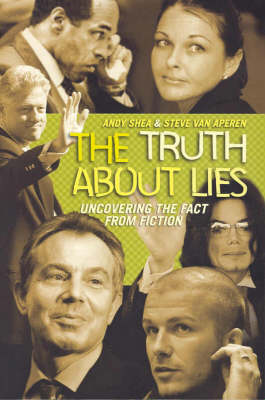Book review: The Truth About Lies
 It's a fascinating premise: two former cops, one of whom is FBI-trained, dish the dirt on how to tell if someone is lying.
It's a fascinating premise: two former cops, one of whom is FBI-trained, dish the dirt on how to tell if someone is lying.And it's the compelling substance of this book that helps me overlook the errors of style that make this book a sometimes annoying read.
The Truth About Lies covers methods of truth-detecting in the past and present, looking at the blood-curdling ordeals of the dark ages, the kind-of science phrenology that, while maligned now, gave physiologists and psychologists some valuable clues to how our brains work.
There's a tour through the parts of the brain that light up when you lie, the polygraph and how it works, and some of the latest scientific methods to uncover the truth.
That's all very interesting, but not so practical unless you're going to join the police. So the book also looks at visual and verbal clues people drop to unwittingly show their deceit. The book also repeats a warning several times: none of these methods are foolproof. Sometimes nervous people who are telling the truth come across as deceptive. Sometimes liars are so accomplished that they can fly right over your internal radar (although not the polygraph, not if the questions are being asked right).
The most useful part for me was a guide to conducting an interview - something I do regularly as a journalist. They use the acronym INTERACTIVE to help prepare for an interview:
I - introduce yourself
N - non-judgemental
T - truth-telling environment
E - explain the process
R - remove distractions
A - actively listen
C - consider physical distance or closeness
T - tea, coffee or water
I - interviewee - are they comfortable?
V - verbal and non-verbal behaviours
E - encourage the interviewee
It's good stuff, whether you're a police interviewer, journo or counsellor.
The Truth about Lies fell short for me in its style of writing. It feels under-edited. Some chapters feel like a very long introduction with no substance, other sections feel like repetitions of the same point over and over again.
Some points in the book reminded me of high school essays - or, in fact, some magazine articles. You get the feeling the authors have a word or page quota to meet, and they're padding like crazy to get there. Consider this at the end:
"This is it, the last few words, in the last moments of our journey. The time has come for a fitting conclusion, some powerful closing words. Something that will have you thinking about this journey long after you've finished this book. Something political, perhaps.."They then do go on with a political message, which to my mind has only peripheral bearing on the story.
Failings and ramblings aside, The Truth About Lies gives you inside information from the people who should know how to get the truth.
The other end of this link says they're out of stock, so perhaps try your local bookstore in Australia or New Zealand. If you're elsewhere, the publisher is ABC Books, and maybe contacting them directly will get you to the bottom of things.


0 Comments:
Post a Comment
<< Home